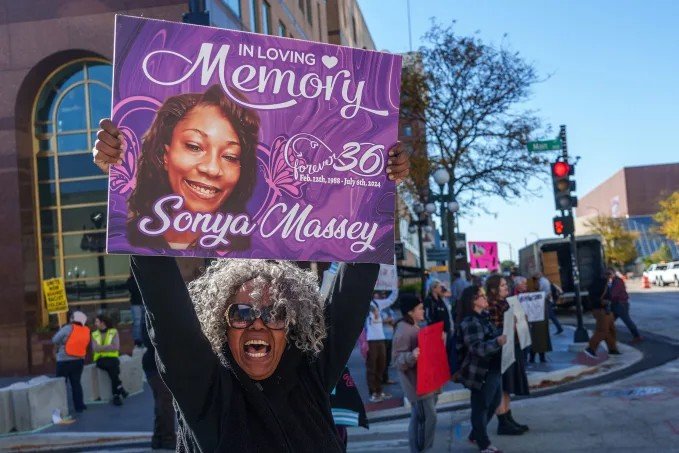Julia Langhorn of Peoria shows her support for Sonya Massey as traffic passes during jury selection of the Sean Grayson trial on October 20 in Peoria. Mayy Dayhoff/Journal Star/USA Today Network/Imagn Images
By. Isaac Christopher Lubogo
Abstract
This discourse examines the killing of Sonya Massey, an African American woman shot dead by a sheriff’s deputy in Springfield, Illinois, after she uttered the words “I rebuke you in the name of Jesus.” It interrogates the legal irregularities, procedural failures, ethical breaches, and racial undercurrents embedded in the case. The essay invites a reawakening of jurisprudential conscience — a call for law to remember its moral spine and for justice systems to transcend mere legality into humanity.
1. Prelude: When Prayer Meets Power
The tragedy of Sonya Massey is a jurisprudential wound that bleeds beyond the borders of America.
She dialed 911 not to fight the law but to find safety under it.
Yet, when help arrived, the protector became the executioner.
Her final words — “I rebuke you in the name of Jesus” — were not defiance, but faith.
Yet they were received as provocation, misread through the eyes of fear and prejudice.
It was not the hot water in her hand that killed her, but the boiling suspicion within the officer’s mind — a suspicion steeped in racial coding and procedural arrogance.

2. Legal Irregularities: The Collapsing Ladder of Proportionality
Under the U.S. constitutional framework and international policing standards, deadly force is justified only when there is an imminent threat of death or serious harm.
The operative word is imminent — not speculative, not racially imagined.
In this case:
Sonya was behind her kitchen counter, holding a pot she had been asked to move.
She had not advanced or attacked.
Her exclamation was verbal, not physical.
The officer’s interpretation — that she was about to pour hot water — was a hypothetical assumption, not a factual reality.
The shot, therefore, was premature, disproportionate, and legally unsustainable under any doctrine of reasonable threat assessment.
In jurisprudential terms, this represents the collapse of proportionality — the most sacred principle in the doctrine of force.
It mirrors a judicial paradox where law, instead of restraining power, legitimizes fear.
3. Procedural Failures: The Death of De-Escalation
Police manuals across democratic jurisdictions establish a hierarchy of response:
Observe → Warn → De-escalate → Restrain → Apply non-lethal measures → Resort to lethal force only as a last measure.
In Sonya’s case, that hierarchy was discarded.
No warning was issued.
No attempt to calm was recorded.
No tactical retreat or alternative option was chosen.
Instead, three shots were fired within seconds — one piercing her head, two her dignity.
The body-cam recording compounds the tragedy with moral apathy:
“She’s done,” the officer said, as he refused to fetch a medical kit.
Here, the procedural irregularity metamorphosed into ethical decay.
For even where the law allows a shot, it never permits indifference to a dying human.
4. Ethical Dimensions: When Theology Becomes Threat
“I rebuke you in the name of Jesus” is a familiar spiritual utterance in Black Christian worship.
It is not a threat; it is a spiritual injunction — a linguistic act of faith rather than violence.
That an officer of the law could interpret it as aggression exposes a deep cultural illiteracy within modern policing.
Faith was misread as defiance, piety as provocation, theology as threat.
This is not merely a failure of training — it is a moral blindness that weaponizes ignorance.
When spirituality is misread as hostility, the state itself becomes unholy.
5. The Racial Undercurrent: The Jurisprudence of Suspicion
Beneath the legal irregularities lies a deeper pathology: the racialization of threat.
From Breonna Taylor to Atatiana Jefferson, a painful pattern persists —
Black women, in domestic spaces, perceived as inherently volatile, even in vulnerability.
Racial bias in policing operates not through explicit hatred but through interpretive distortion.
A white woman saying “I rebuke you in the name of Jesus” might be seen as eccentric or fearful.
A Black woman saying the same is cast as unstable or dangerous.
This interpretive asymmetry forms what I call the jurisprudence of suspicion — the silent presumption that Black existence itself is potential aggression until proven otherwise.
Thus, Sonya’s color became her crime, and her faith her fatal evidence.
6. The Duty to Preserve Life: When Humanity Is Proceduralized Out of Policing
The refusal to render medical aid after shooting her is not just callous — it is unlawful.
Under both domestic police protocols and international human rights law, officers have a duty to provide immediate medical assistance after using deadly force.
To dismiss a bleeding citizen as “done” is to declare death before its occurrence — to usurp not only medical judgment but divine sovereignty.
This act symbolizes the dehumanization of the subject — the quiet transformation of a human being into a disposable object of procedure.
7. Mental Health, Faith, and the Untrained Eye
Reports suggest that Sonya Massey was managing paranoid schizophrenia — a condition requiring compassion, not confrontation.
Instead of summoning a mental-health crisis team, the officers met fragility with firepower.
The systemic absence of crisis intervention protocols speaks volumes:
society funds bullets faster than it funds understanding.
This is a moral indictment not just of one officer, but of an entire architecture of neglect.
8. Ethical Jurisprudence and the Theology of Justice
If faith can be fatal, then jurisprudence must repent.
Law must evolve to include cultural literacy as a component of “reasonable force.”
For what is reasonable to one man may be racist to another.
True justice demands not just the legality of action, but the morality of intention.
The officer’s fear may have been genuine — but a genuine fear born of prejudice is still unlawful fear.
In this sense, the killing of Sonya Massey is not just a violation of law; it is a violation of theology.
It is the criminalization of belief, the sacrilege of misunderstanding, the death of innocence in the hands of ignorance.
9. The Universal Lesson: Beyond Illinois, Beyond America
Though the blood spilled was in Springfield, the warning resonates from Chicago to Kampala.
Across continents, police systems continue to mistake power for protection and obedience for justice.
The Sonya Massey tragedy thus becomes a universal allegory — a mirror held up to all societies that allow fear to substitute for law.
The Ugandan, African, and global legal fraternity must recognize this as more than an American failure.
It is a human failure, and unless the law reclaims its soul, such tragedies will become jurisprudential norms.
10. Conclusion: When Law Must Bow Before Conscience
Sonya Massey’s last words were not meant to provoke but to protect herself spiritually.
In a twisted irony, her invocation of divine defense triggered mortal destruction.
And so we are left to ask:
What kind of justice system kills faith for being misunderstood?
What kind of law protects fear but not innocence?
Who, truly, needs rebuking — the woman who prayed, or the system that forgot how to be human?
If justice still breathes anywhere beneath the sun, then the rebuke stands —
not from Sonya to the officer, but from the heavens to the law itself:
“I rebuke you, in the name of Jesus.”
Author’s Note
This essay is dedicated to all who died misunderstood —
those whose prayers became evidence against them, whose faith was mistaken for defiance,
and whose humanity was eclipsed by systemic blindness.
May the law learn again to listen — not only to words, but to the sacred silence between them.








